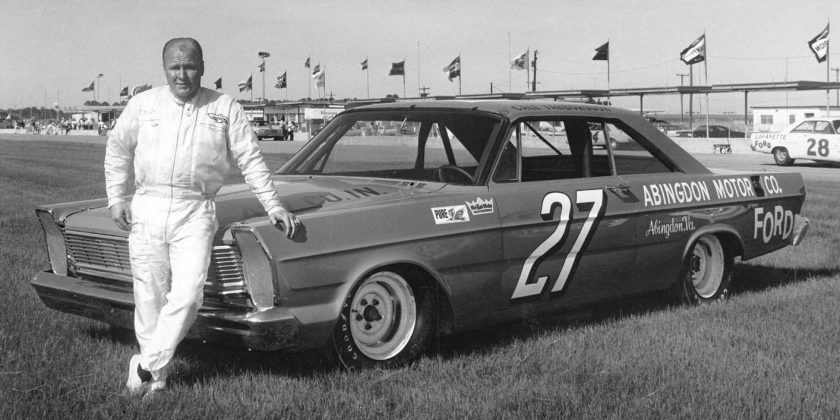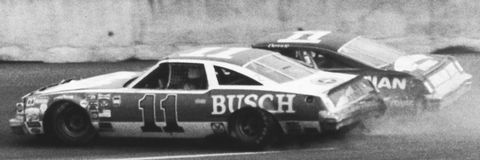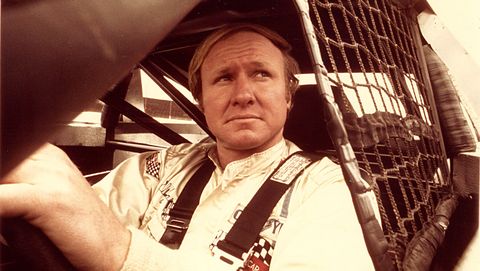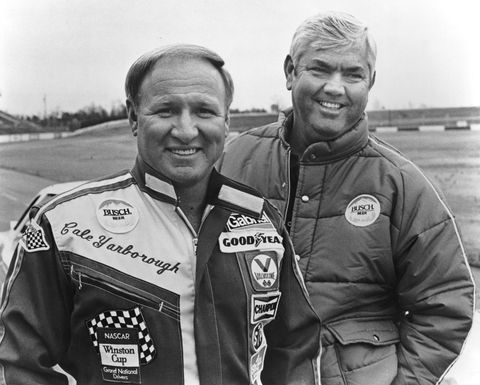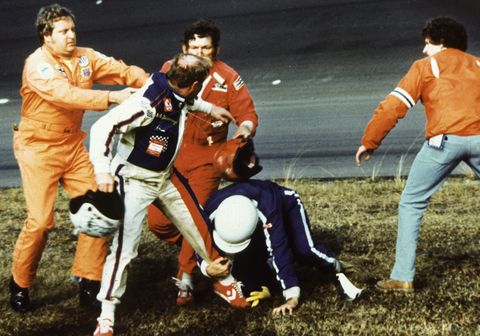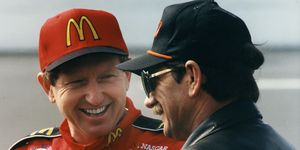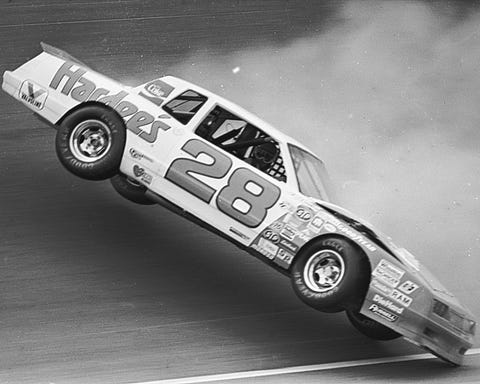In the world of race car drivers, there is tough, and then there is Cale Yarborough tough.
Cale Yarborough tough is another level, right up there with A.J. Foyt tough.
Let Pete Hamilton, once a key challenger to Yarborough when Cale drove Wood Brothers Mercurys and Hamilton was in Petty Enterprises Plymouths, offer a description.
“Probably the guy I battled with more than anybody else was Cale Yarborough,” Hamilton said in an interview years after their glory days. “We had some pretty tough fights in a lot of different places. One that comes to mind was at Michigan.
“We banged fenders all day long. At the end, he got paid for first. It was his determination. In those days, we didn’t have side glasses or window netting, so you could look over at the other guy going down the straightaway. I remember looking over at Cale. Even at 185 miles per hour, you could see the determination in his eyes.”
That race was at Michigan International Speedway June 7, 1970. Yarborough took the lead from Hamilton with two laps to go and outran him by .3 of a second at the finish.
It was one of 83 Cup victories Yarborough would score across a driving career that stretched from 1957 to 1988. He was the first driver to win three consecutive Cup championships (1976-78). He won the Daytona 500 four times and the Southern 500 five times. Among many notable Yarborough statistics: He led 21 percent of the laps he raced.
Yarborough’s first win came under unusual circumstances. He was scheduled to drive a Ford owned by Kenny Myler in a 200-lap Cup race at Valdosta, Ga. June 26, 1965. But bad weather trapped Yarborough in Charlotte, N.C., and he couldn’t make the trip to southern Georgia. Sam McQuagg started the race in Myler’s car, but rain halted the event after 25 laps, causing a postponement to the next day.
Standard NASCAR procedures call for races that are interrupted by rain to resume on the next clear day at the point at which they were halted. For whatever reason, the Valdosta race started at lap one the next day, and Yarborough, after driving from Charlotte and sleeping in his car (along with his wife and two daughters), was there. He led the last 18 laps to break into the Cup winner’s circle in his 78th career race.
If the race had resumed on the 26th lap, McQuagg would have been credited with the win because NASCAR considers the driver starting races as the “official” driver for the record.
The circumstances notwithstanding, Yarborough had established himself as a winner. Three years later, he scored what he has always considered his biggest win in the 1968 Southern 500 at Darlington Raceway, his “home” track and his favorite. That Labor Day afternoon was brutally hot, and photos of Yarborough in victory lane show his grimy face grinning through the exhaustion.
He was fully launched into a career that would make him an all-time stock car racing great.
Yarborough grew up on a farm in rural South Carolina and carried the work ethic he had learned as a youth into racing. He drove every lap as if his next meal depended on it. Sometimes, it did. He and his wife, Betty Jo, struggled through the early years on a wing and a prayer.
That brand of toughness was a throughline throughout Yarborough’s career.
“He would not quit,” said Junior Johnson, Yarborough’s car owner during his championship seasons. “I think if he was in a situation where he had to get out of a race car because of his stamina, it would be the most embarrassing thing that ever happened to him.
“He was the most determined. There was no end to his willpower. He stood apart. He was smart. He was kind of ‘sneaky’ brave.”
It is a reality of the television age that Yarborough’s place in racing lore will be pegged not to his long list of accomplishments but to a race he didn’t win—the 1979 Daytona 500. In one of the most famous NASCAR finishes of all time, Yarborough and Donnie Allison crashed while racing for the lead in the third turn on the final lap, opening the door for Richard Petty to inherit the win. Yarborough and Allison, joined by Donnie’s brother, Bobby, engaged in brief fisticuffs near their crashed cars, giving television viewers, many new to NASCAR, a quick tutorial in the sport’s sometimes wild ways.
Remembering that day years later, Yarborough said, “I think it opened the world’s eyes to stock car racing. I mean, they said, ‘These guys are for real. They’ll get out and duke it out if they have to.’ The only regret I have is that it wasn’t a better fight.”
Yarborough and the Allisons settled their differences quickly and raced on.
A star athlete in high school, Yarborough could have followed any number of paths into adulthood. He seriously considered attending Clemson University on a football scholarship but eventually told coach Frank Howard he wanted to pursue a career as a race car driver. “You’ll starve to death, son,” Howard told him.
Yarborough was pleased to prove Howard wrong, and they became fast friends, Howard later joining Yarborough in a victory lane celebration at Talladega Superspeedway and pulling him aside to admit that, yes, questioning the kid’s career choice was a bad move.
Across the years, many competitors perhaps wished Yarborough had pursued that other game.
But wait … there’s more
• Yarborough experienced the definition of a mixed experience in qualifying for the 1983 Daytona 500. On the first of two laps, he ran the fastest qualifying lap in NASCAR history—200.503 mph. On the second lap, Yarborough’s Chevrolet lost traction in the third turn, slid to the right, lifted into the air and landed on its roof before slamming into the outside wall. He was frustrated but not injured.
• Two of Yarborough’s Cup championship trophies were destroyed in a fire at his Florence, S.C. Honda dealership in 1988. He lost other racing memorabilia in 2007 when a propane tank explosion destroyed a workshop near his home.
• A year before he scored his first Cup victory, Yarborough, in addition to racing, was doing grunt work in the Holman-Moody racing shop in Charlotte, N.C. for $1.25 an hour.
• In 1983, an album of country music was released that is unlike anything seen before or, thank goodness, since. It was an album of old-school western-style music performed by NASCAR drivers. And Cale Yarborough was one of the drivers-turned-artists. A record called Stock Car Racing’s Entertainers of the Year featured, among other tunes, Yarborough’s rendition of “The Winner.”
Source: Read Full Article
